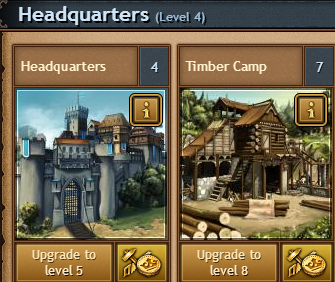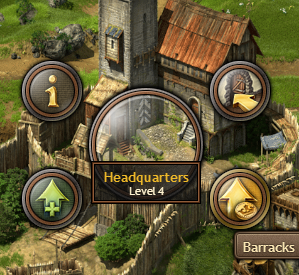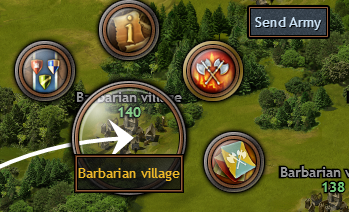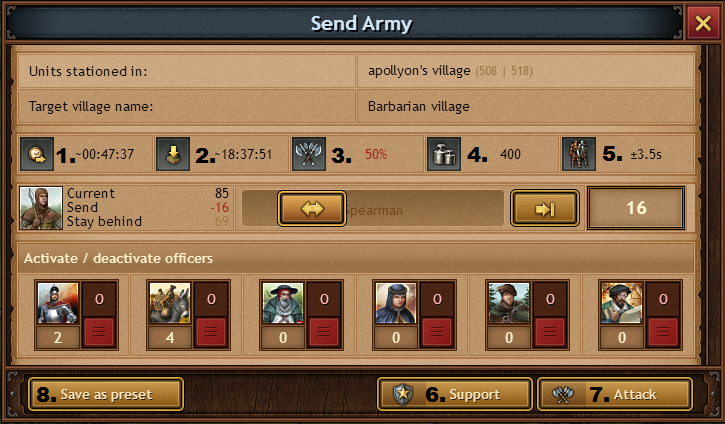Basics: Difference between revisions
No edit summary |
|||
| Line 1: | Line 1: | ||
[[Category:Help]] | |||
= Resources = | = Resources = | ||
Revision as of 17:11, 23 June 2014
Resources
To construct buildings or recruit units you need resources. You receive resources automatically from your resources production (timber camp, clay pit, iron mine). You also receive those resources when you are not logged into your account.
The amount of resources that you get depends on the level of your resource buildings. It is important to build up your warehouse to make sure that you don't lose the resources that don't fit. At the top right of your screen you can see how many resources you currently have. The progress bar shows you, when the storage is full.
The numbers show the resource amounts that are stored right now. (601 wood, 538 clay, 716 iron). The max. amount of resources in this example is 1000, so that's why the progress bars are approximately in the middle.
Hint: Always try to spend all your resources in buildings or units. If you're getting attacked and there's nothing to plunder, it's likely that the enemy will lose interest in your village.
Provisions
Buildings and units also need provisions. In contrary to the other resources, provisions are not produced over time but provided by the farm. The higher it's level the more villagers can be supplied.
The number shows the amount of villagers that additionally can be supplied. So for example 821 Spearmen could be recruited in this village. The progress bar shows the ratio between free and used population, in this case a very small amount of population is already used, and there is a lot of free population.
Crowns
In the upper right corner you can see your current amount of crowns. You can buy additional crowns if you click on the + button.
First steps
In the beginning you mostly need one thing: Resources. The timber camp cuts wood, the clay pit collects clay and the iron mine produces iron. The more you expand those buildings the more they produce. When you first join a world it is recommended to build up your resource production by a few levels.
After you have secured a good base production of resources you can start building troops. In the barracks you can start recruiting spear fighters. Spear fighters offer some protection against would-be attackers who might want to plunder your resources. They are not usually good offensive troops, but they are useful for raiding very small, undefended villages in order to plunder their resources.
In addition to recruiting troops, there are also other ways to help protect your village and defend your resources in the early stages of the game. One way to protect your resources is to research technologies like the attic, cellar or bunker in the warehouse. Another good deterrent is to build a wall (Level 4 headquarter needed). The higher your wall level the stronger your village's basic defense will be. This means your enemies will suffer higher losses when they attack villages with higher wall levels.
If you find you have excess resources, you might want to consider building a market. (Level 8 headquarters needed). In the marketplace, you can see what your neighbours are offering and trade away resources you don't want. You can also create your own offers.
You should also look around your area to find a good tribe to join. It is always easier to fight and defend in a group. It is also a good way to meet some nice people!
Late start?
Should you join a world that has been going on for a while already it is recommended to change your strategy a bit. It is of course still important to get a good basic resource production so that it is possible to build up your village quickly. But you have to quickly start protecting your village. For that it is best to build up your wall, the warehouse researches and also to build a few units. Writing to your potential attackers can often help as well. It is always recommended to use the units you produced to plunder other villages. The plundered resources greatly help your growth.
Now we'll show you the biggest difference to the usual start:
Don't make the mistake of concentrating too much on creating your first nobleman. It might sound logical to try to get a second village as quickly as possible but it does not help you if you can't defend your villages. If you only concentrate on the noblemen you are an easy target, and also a well-liked target as bigger players would love to have a village that is already on the way to being ready to produce noblemen. By the time attacks start coming in, it's usually too late.
One method of preparing for this is to use a defensive strategy. This means creating lots of sword and spear fighters. If you create enough troops then you are a very expensive target and your attacker will usually try to find an easier target. Morale also helps you if you are attacked by bigger players. A very big player loses up to 70% of his attack strength due to morale.
The security phase can take some time, but it will usually pay off, as you can always use those defensive troops in the later game. Once you have a good amount of defensive troops - something like 1200 spears and 1200 swords - you can start thinking about a nobleman.
You will probably be able to tell how valuable that tactic was by looking at your neighbors' villages ...
Construct buildings
There are two ways to construct a building. First one is to open the village headquarters and then click on "upgrade to level X" of the building you want.
If you are more experienced and know what building you want to upgrade, you can simply click the "upgrade" bubble in the ring menu of a building without opening the headquarter.
You need the specified amount of wood, clay and iron, as well as some free population. The exact amount depends on the kind of building and its level. The bigger you want to construct the building, the more resources are needed for the next level.
Hint: You can recognize unlocked, but not yet constructed buildings, by a construction site in your village. In addition to this a "+" symbol will be visible. You can already click on those sites to open the ring menu.
Recruit units
You can recruit your first units in the barracks. To construct barracks you need to upgrade your headquarters to level 2. First you will only be able to build spear fighters; for other units you need to upgrade the barracks. In the Unit overview you can find a short description about the requirements for a certain unit and what its properties are.
Attacking other villages
It is important, especially in the beginning, to constantly get resources. An efficient way to do that is by plundering barbarian villages in your neighbourhood.
To attack a village, switch to the map, click an enemy village and chose the "send army" button. You will see this window:
In the top you can see the start and the target village of your army. Below that are some important values you should always have a look at before sending the troops.
Only your own units that are currently available in your village are shown here.
Click here for an explanation of the generals.
Hint: You can create as many presets as you want. For example small farm armies with 100 spear fighter or a complete offensive force with thousands of different units.
A preset can also be used to easily recruit an amount of set units in a village. You can also assign units to a preset that are still locked for your village if you create the preset within the rally point.
It is best to create a preset of your desired army in your village and use this for recruiting.
Why join a tribe?
Tribal Wars 2 can be played as a single player game, but the original idea of Tribal Wars is to band together and play in teams. Not only will you have economical and military support, to protect you from more advanced players, but you can also learn tactics and game mechanics from your fellow tribe members. Tribes are a fundamental part of the game that will greatly enhance your gamiing expirience and increase your success on the leader-boards. Joining a tribe is highly advised.




